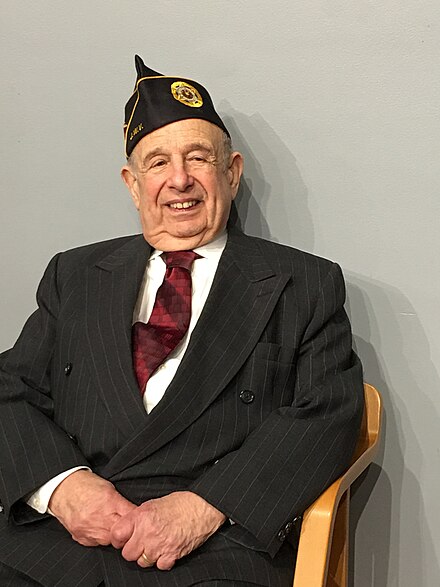It is often said you can never go home. The underlying meaning is that after a lengthy separation from a place in which you were born or lived many years, the feeling of comfort is never the same.
Just imagine that your parents sent you more than 7,800 miles away to another country to avoid death amidst a systematic obliteration of people endangered because of their religion.
This is a story with a mixed ending: happy on one level, sad on another.
During World War II as German Dictator Adolph Hitler was occupying most of Europe and killing millions of Jews, the United States War Department employed an innovative idea. And it worked.
Our state played a role. More about that later.

Gunther Stern
Gunther Stern, a German Jew, was an integral part of a scheme that expedited the defeat of Hitler’s forces. Roughly 2,000 young German, Austrian and Czech men, mostly the eldest sons—thoughtfully and painfully thrust by their heartbroken parents into a safer environment in the U.S.—acquired invaluable intelligence that bolstered Allied forces.
Stern recently died at 101.
When they stepped upon American turf as teenagers, they could not have foreseen a return to Europe as non-commissioned officers in the American Army, deployed as intelligence operatives. They performed superbly.
They used their native linguistic skills, cultural familiarity and intelligence to dissect and analyze German battle plans. They became expert interrogators. They controlled their emotions when interrogating intransigent prisoners (POWs). They were soldiers entrusted with the mission to learn and communicate German plans.
Among the questions they sought to answer: were the Germans close to launching new rockets? Were they beginning to use chemical warfare? What was their progress in building an atomic bomb?
Who could do it better? Who could be more passionate about their mission?
At one point, confronting POW obstinacy, Stern adopted an unusual mode of questioning. Aware that German soldiers feared capture by the Russians and an all-expenses trip to the frozen tundra of Siberia, Stern disguised himself and accent as an eccentric, cantankerous Russian officer to gain information. The strategy worked.
Western Maryland’s Fort Ritchie (now closed), near Hagerstown in Washington County, was the site of the eight-week intelligence training. Instruction was intense. Twenty-five percent of enrollees dropped out.
Ritchie training also included 20,000 American soldiers with roots in the United States.
The young immigrants not only learned about interrogation and sophisticated intelligence gathering, but also the oldest U.S. military force, the Army. They also endured basic military training.
At the end of their intelligence training, the “Ritchie Boys” became American citizens. I suspect citizenship mattered more than rank. They eventually achieved fame. They became the subjects of books and a documentary.
Though I realize that the Ritchie Boys garnered a well-deserved reputation, I did not expect that an obituary for Guy (Americanized from Gunther) Stern would appear recently in Britain’s “The Telegraph.” My good British friend in Dorset, a Talbot Spy subscriber, sent it to me.
Much of this column is attributable to the detailed obituary.
Several years ago, an Easton friend (with British connections) loaned me “Sons and Fathers,” a splendid book describing the “Ritchie Boys” war effort. It was then that I learned about an unusual intelligence-gathering operation. I met Stern through the eye-opening pages of this book.
I was hooked.
By the end of the war, Stern had attained the rank of master sergeant and earned the Bronze Medal. After the war, he eventually became a professor of German and Slavic Studies in his adopted country, including a stint at the University of Maryland.
While Guy Stern enjoyed good fortune as an American patriot and citizen, he faced sadness when he returned to his birthplace in Hildesheim. He discovered that the Nazis had confiscated his family home and sent his parents, brother and sister to the besieged Warsaw Ghetto, never to be seen again.
Hildesheim later made him an honorary citizen. This tribute wreaked of sorrow and heartbreak to a German native who escaped death because of his determined father. He was 14 when he embarked from Hamburg, Germany for America.
Yes, you can physically return to your roots. As Stern learned, his home was devoid of his family. His connection offered haunting memories of a loving family killed by an evil man.
Hildesheim could never be the same. Nor could Guy Stern.
Columnist Howard Freedlander retired in 2011 as Deputy State Treasurer of the State of Maryland. Previously, he was the executive officer of the Maryland National Guard. He also served as community editor for Chesapeake Publishing, lastly at the Queen Anne’s Record-Observer. After 44 years in Easton, Howard and his wife, Liz, moved in November 2020 to Annapolis, where they live with Toby, a King Charles Cavalier Spaniel who has no regal bearing, just a mellow, enticing disposition.



Beth Hill says
60 minutes did an excellent segment on the Richie Boys which was fascinating.